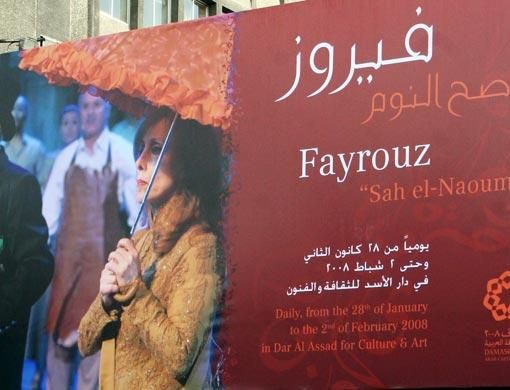Beirut: Revered throughout the Arab world for five decades, the much beloved and iconic Lebanese diva Fairuz has found herself embroiled in Lebanon's bitter crisis with Syria.
Fairuz, long the doyenne of Arab singers, travelled to Syria last week to appear in a six-day run which began on Monday at the Damascus Opera House of her classic 1970 musical "Sah Al Naoum," an Arabic expression for "Did you sleep well?"
Her appearance is a highlight of a series of cultural events in Syria this year to mark Unesco designating Damascus as the 2008 Arab capital of culture.
Her decision to sing in Damascus, however, has caused a split in her huge fan base in Lebanon between those arguing that Fairuz should not perform before the rulers of a country blamed for a string of assassinations in Lebanon over the past three years, and others who maintain that the Lebanese diva is above politics and should sing wherever she wishes.
"Those who love Lebanon do not sing for its jailers," says anti-Syrian legislator Akram Shehayeb.
A poll conducted by the "Now Lebanon" web portal, which is sympathetic to the March 14 coalition in Lebanon, found that 67 per cent of respondents were against Fairuz appearing in Damascus.
"Simply, this is not the moment for a musical love-in," a Now Lebanon editorial said. "Fairuz must decide. She is a Lebanese icon, and, as such she must repay the people who have backed her and who love her with a modicum of solidarity."
Born Nohad Haddad, she was given the stage name Fairuz, Arabic for Turquoise, by an early mentor. Her first major concert was in 1957. She became an instant sensation and, in collaboration with her musician husband, Assi Rahbani, and his brother Mansour, her acclaim rose during the 1960s and 1970s.
Fairuz has consistently remained aloof from politics, saying her music was for the people only. Apart from a single concert in 1978, she famously refused to sing in Lebanon during the 1975-90 civil war in disgust at the warring militias, who continued to adore her nonetheless.
Her songs are regularly played during times of difficulty in Lebanon, and, for older generations, they evoke a nostalgia for Lebanon's golden years in the 1950s and 1960s.
A recluse who has given only three interviews in her five-decade career, Fairuz has not responded to her critics.
However, her former musical partner Mansour Rahbani said her decision to sing in Damascus was "a message of love and peace from Lebanon to Syria. A message of friendship, not subservience."
Certainly, Syrians are delighted that Fairuz is back in Damascus, her first appearance in the Syrian capital since 1982.
"The Syrians are thrilled, especially the Damascenes," says Sami Moubayed, a historian of Syria's post-independence period in the 1950s.













